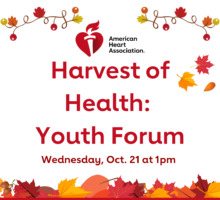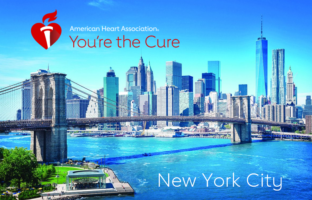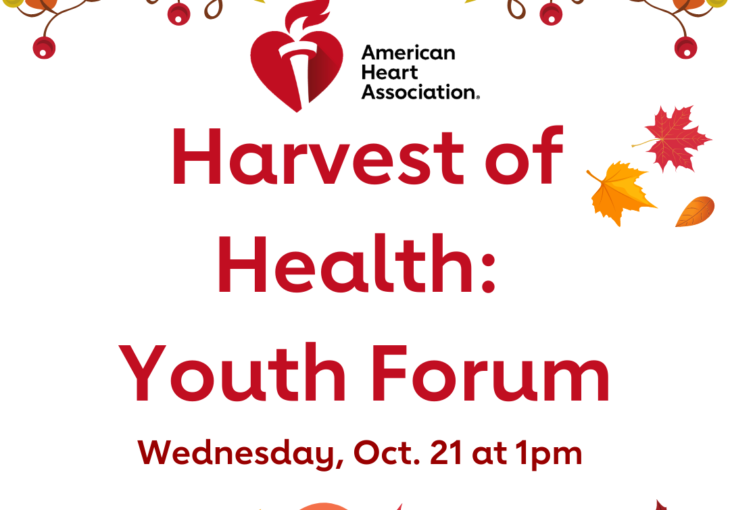
Welcome to the American Heart Association in New York City’s first annual Harvest of Health. We are thrilled to be bringing you the first installment of our seasonal webinar series. In today’s webinar we will be focusing on the topic of youth health. But before we get started, we want to share some important resources and materials to help you dive deeper into the topics and, hopefully, take control of your health!
As we will try to keep the conversation flowing smoothly, time constraints may force us to accidentally skip over some of the important topics or not cover them as extensively as we would prefer. We hope you will use this page as a resource library. It’s chocked-full of helpful links.
Sugary Drinks and Diabetes
Many people consume more sugar than they realize. It’s important to be aware of how much sugar you consume because our bodies don’t need sugar to function properly. Added sugars contribute zero nutrients but many added calories that can lead to extra pounds or even obesity, thereby reducing heart health.
Natural sugars are found in fruits, vegetables, milk and grains. Other sugars — the kind added to foods, drinks and condiments during processing — may increase heart disease risk. A typical 12-ounce can of regular soda has 130 calories and 8 teaspoons of sugar. Added sugars also sneak into seemingly “better for you” beverages, such as sports drinks, fruit drinks and flavored milks.
Healthy Kids Are Sweet Enough: Recommendations for Healthy Kids and Teens
Tips for Cutting Down on Sugar
Tracking Down Sugar in Nutrition Labels
12 Infused Water Recipes Video
Vaping and E-cigarettes
Vaping is becoming an increasing epidemic among teens. In 2018, e-cigarette use nearly doubled in high school students. Vaping is the act of inhaling and exhaling the aerosol, often referred to as vapor, which is produced by an e-cigarette or similar device. The term is used because e-cigarettes do not produce tobacco smoke, but rather an aerosol, often mistaken for water vapor, that actually consists of fine particles.
While e-cigarette vapor may have fewer toxic substances than cigarette smoke, e-cig users are still exposed to nicotine, which is a dangerous and highly addictive chemical, as well as toxins, metals and contaminants. Varying amounts of toxic chemicals have been linked to heart and respiratory diseases and cancer.
How Smoking and Nicotine Damage Your Body
Black Lives, Black Lungs (mini documentary)
Want to Talk to Your Teen About Vaping?
Benefits of Quitting Smoking Now
Physical Exercise
Staying active is one of the best ways to keep our bodies healthy. It can also improve your overall well-being and quality of life.
Are you fitting in at least 150 minutes (2.5 hours) of heart-pumping physical activity per week? If not, you’re not alone. Only about one in five adults and teens get enough exercise to maintain good health. Being more active can help all people think, feel and sleep better and perform daily tasks more easily. And if you’re sedentary, sitting less is a great place to start.
Why is physical activity so important for health and wellbeing?
Recommendations for Physical Activity in Children
Move More Together: AHA Series of Family Workouts
Mental Health and Wellness
Mental health includes our emotional, psychological, and social well-being. It affects how we think, feel, and act. It also helps determine how we handle stress, relate to others, and make choices. For years, doctors thought the connection between mental health and heart health was strictly behavioral – such as the person who is feeling down seeking relief from smoking, drinking or eating fatty foods.
That thinking has started to change. Research shows there could be physiological connections, too. The biological and chemical factors that trigger mental health issues also could influence heart disease.
How Does Depression Affect the Heart?
Meditation to Boost Health and Well-Being
Busy Parents and Caregivers Must Care for Themselves
How to Break Bad Habits and Change Behavior
How to Boost Willpower infographic
COVID-19
As we all continue to adapt to life during the COVID-19 pandemic and get into some routine, it’s extremely important that we don’t let our guard down. The best way to do that is to stick to the simple things we know can stop the spread of the coronavirus: continue social distancing, wash your hands frequently, wear a mask or cloth face covering, cover your coughs and sneezes, and try not to touch your mouth, nose or eyes.
Coronavirus Precautions for People Facing Higher Risks
How the American Heart Association is Making a Difference
You’re the Cure Network
The American Heart Association advocates for heart-healthy and stroke-smart communities through legislative and regulatory policies in New York City, and we need you to join us!
 Join the You’re the Cure Network
Join the You’re the Cure Network
